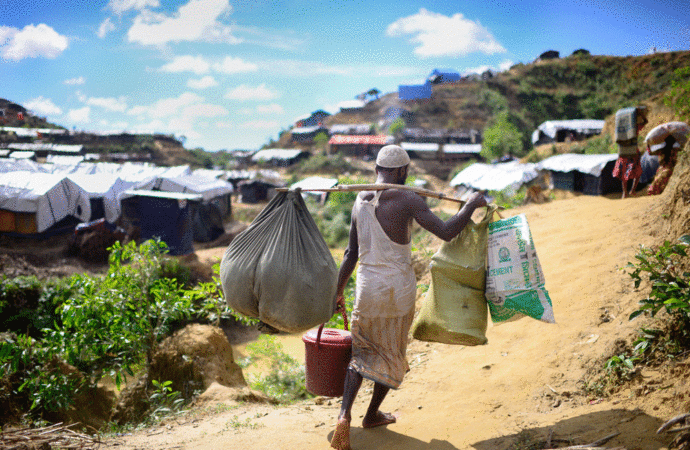by Makshudul Alom Mokul Mondal
The re-emergence of ultra-nationalism in Europe and the United States and the economic dominance of the global south, led by China and India, are often conceived to cause the dilapidation of global clout maintained by the wealthy nations of the north.
While the economic and cultural influences of China and India have surely put the north into severe competition, both these countries failed to rise to the occasion to demonstrate real leadership when humanity was threatened.
People were brutally murdered, and minorities were persecuted in their neighbouring country, Myanmar.
The Rohingya crisis is not a new phenomenon but decades old, where a minority ethnic community living in the Rakhine state was systemically marginalized and stripped of any basic human rights, particularly citizenship.
Interesting is how the military junta, ruling over Myanmar for half a century, took its time to cleanse the entire Rohingya community, even changing the name of the historic Arakan province to Rakhine State to establish an evident preference for the Rakhine community in the 1990s.
The refugee crisis escalated during this period, where more than 250,000 fled to Bangladesh in hope for shelter and protection.
Despite being a resource-scarce, overpopulated country with its own internal problems, Bangladesh has exhibited courageous leadership in opening up its border and giving shelter, food, and safety to these impoverished, forgotten people.
While the situation was exacerbating rapidly in September of 2017, Indian Prime Minister Narendra Modi — now ranked among the top three powerful global leaders — preferred to deflect discussing the Rohingya issue for strategic, economic, and geo-political reasons, saying “you have a very good international image, Rohingya destroy it.”
To make things worse, PM Modi’s Hindu Nationalist government proposed to deport 40,000 Rohingya Muslims for security concerns.
Should you need to become a leader of the global south, start acting like a leader and stand for what is right and stand against what is wrong
China has been a silent supporter of Myanmar’s anti-terrorism campaign, which has been termed as a “textbook example of ethnic cleansing” by United Nations rights chief Zeid Ra’ad Al Hussein. China has been consistently blocking the UN’s efforts to end military intervention and appease the Rohingya crisis.
However, contrary to India’s controversial position, China brokered a deal, leading to a repatriation agreement between the two countries, regarding which uncertainty and suspicion continue to manifest.
Strategic partners of Bangladesh, India, and China have kept themselves blindfolded, refusing to pay heed to the inhumane actions and the escalating genocide in their own backyard, impacting and exhausting the entire region.
Compared to Bangladesh, Myanmar is undoubtedly more important to both China and India economically, politically, and geo-strategically. A largely unexploited country full of national resources and access to sea, Myanmar holds a special position for India and China.
Both countries have invested heavily to develop infrastructure: Roads, rails, and ports which would give the landlocked regions of China and India access to the sea.
Once again, in the history of human civilization, money wins against man.
Unlike them, European countries have shown real leadership to condemn the atrocities, create global consensus, impose pressure on Myanmar government, and expand aid to the victims.
High-level delegation teams including heads of states have visited the refugee camps, extended their solidarity with the deprived Rohingya, and reiterated their commitment to push for their peaceful and secured return home.
Unfortunately, no one from Delhi or Beijing cared enough to visit, witness, and listen to the sufferings of the Rohingya living in vicious conditions.
For emerging superpowers like India and China, such a strange stance has not only questioned their commitment to global peace and stability, but has also negated and severely weakened their regional and international leadership.
Leadership is required during difficult times, and it takes a lot of courage to be steadfast on core human values. In spite of having a dark past, time and time again, the global north has evinced their commitment to help the frail and fallible.
The quest for a sustained solution for this long-lasting humanitarian crisis could bolster the position of regional superpowers, strengthening their influence over the sub-continent and rest of the world.
It is pertinent that Delhi and Beijing take note that while economics and politics are important, nothing can be more important than human lives.
When you remain a bystander to crime, you become a silent accomplice.
Should you need to become a leader of the global south, start acting like a leader and stand for what is right and stand against what is wrong.
For India and China, they need to do a lot more to attain that stature. They still have time to ameliorate their global image by supporting the Rohingya and ensure their safe repatriation and settlement.
Makshudul Alom Mokul Mondal is a researcher and an enthusiast of international affairs and geo-politics. He is also the co-founder of Youth Opportunities, an award winning international organization and one of the largest opportunity discovery platforms for youth all over the world.
Source: Dhaka Tribune










